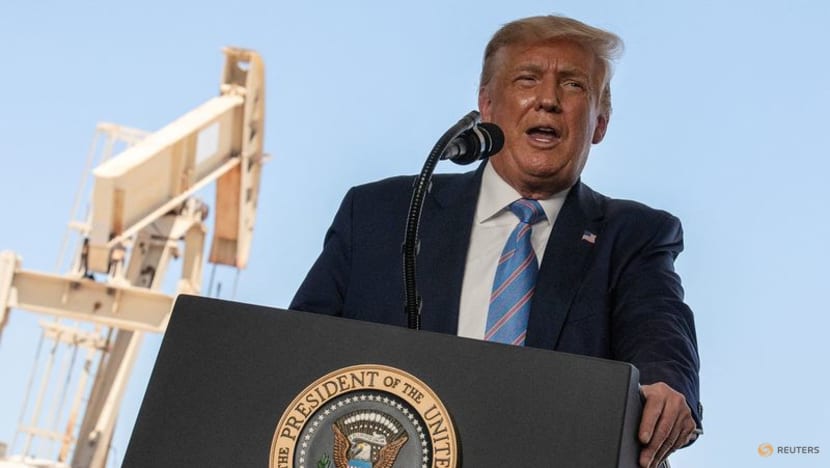Commentary: China will step up if US falls behind on climate action
Even under a second Trump administration, climate targets and negotiations will continue, with China stepping up to lead the global energy transition, say RSIS’ Peili Pey and Danielle Lynn Goh.

US President Donald Trump delivers a speech during a tour of the Double Eagle Energy Oil Rig in Midland, Texas, US, Jul 29, 2020. REUTERS/Carlos Barria/File Photo

This audio is generated by an AI tool.
SINGAPORE: Donald Trump’s victory at the 2024 US election has been met with trepidation by environmentalists around the world, given his track record of dismantling environmental regulations and driving increased oil and gas extraction.
Trump’s comeback to the White House will likely throw a spanner in climate action both domestically and internationally. In 2017, he withdrew the United States from the Paris Agreement to limit global warming to 1.5 degrees Celsius. There are concerns that he would do the same when he takes office.
Some measures in the US that are expected to see rollbacks include incentives and subsidies for clean energy such as wind and solar, and the Environmental Protection Agency’s rules against coal-powered electric plants, methane emissions and tailpipe emissions. Oil drilling in Alaska’s wildlife refuge will likely re-commence under Trump’s administration.
As the largest carbon polluter historically, the United States has a responsibility to reduce its emissions - but this will not be met when Trump embraces aggressive fossil fuel drilling and burning.
US CLIMATE LEADERSHIP IS DEBATABLE
Even without the Trump administration acknowledging human-driven climate change, extreme weather events have cost the United States a whopping US$24 billion in 2024 . Hurricane Helene and Hurricane Milton struck the south of the country in a span of two weeks, killing dozens and destroying homes. Such disasters will become more intense, frequent and costly as temperatures rise.
US President Joe Biden has also been criticised for not doing enough to combat climate change. The Biden administration issued 20 per cent more oil and gas licenses than Trump in his first term, revealing the hypocrisy of heavy fossil fuel investments despite its supposed climate commitments.
Biden did not attend the COP29 talks at Azerbaijan, passing up the chance to assert the US’ climate leadership in the last year of his presidency.
Already, the US$300 billion COP29 deal to help developing countries mitigate and adapt to global warming has been criticised as insufficient, compared to the several trillions needed by 2030. And it is certainly unremarkable when compared to record-high US$7 trillion worth of subsidies the fossil fuel industry received in 2022.
But these developments may not be all doom and gloom when it comes to climate action.
CHINA LIKELY TO STEP UP
While the US falls behind on climate action, other countries are stepping up. Even if the US exits from the Paris Agreement, as it did in 2016, climate targets and negotiations will continue, with China stepping up to lead the global energy transition.
Progress in climate financing, the key agenda at this year’s COP, has admittedly faced setbacks in terms of contributions from wealthy developed countries. But widening the donor pool to emerging economies such as China and oil-rich states could help if America pulls out from the agreement.
China is increasingly positioning itself as a climate leader, evident through its climate partnerships with countries such as Australia, France and Germany. As part of its cooperation with the African Union, China is involved in more than 120 climate projects throughout the continent.
Closer to home, China has partnered with Southeast Asian countries on technology exchanges and environmental monitoring applications.
Having ratified the Paris Agreement and the UN 2030 Agenda for Sustainable Development, China has the potential to advance emerging energy technologies. If the US falls back on global climate cooperation and investment, China and other states will fill the gap.
IMPLICATIONS ON SOUTHEAST ASIA’S ENERGY TRANSITION
In a tense political climate rife with US-China rivalry, climate action can be a key issue that fosters or reduces grounds for cooperation.
On one hand, Southeast Asia presents an opportunity for the US to grow its investments in the region’s green energy transition. The Association of Southeast Asian Nations (ASEAN) has set a renewable energy target of 23 percent by 2025 in total primary energy supply.
Under the Biden Administration, there was some progress between the US and ASEAN on climate cooperation, through the US-ASEAN Comprehensive Strategic Partnership and the first ASEAN-US Ministerial Dialogue on Environment and Climate Change in 2023.
However, it remains to be seen if Trump will advance climate cooperation initiatives with ASEAN. During his last term as president, the Trump administration arguably saw Southeast Asia as a low-priority region within the wider Asia-Pacific.
Trump’s America First approach and campaign pledges to enact protectionist measures such as steep tariffs are likely to trigger tit-for-tat reactions from China. Additionally, the US would ramp up its competition with China in renewable energy.
These developments would largely have a mixed effect on Southeast Asia. We would likely see increased opportunities and investments in the region with other countries seeking to diversify their supply chains.
At the same time, the region would also suffer disruptions or increased costs of critical minerals and green technologies following any repercussions from protectionist measures by both US and China.
COUNTRIES MUST STICK TO CLIMATE COMMITMENTS
Southeast Asian countries, including Singapore, will benefit from increased cooperation with the US on climate. While there may be a loss of climate financing to the regions’ projects under a Trump administration, US clean energy companies may look to Southeast Asia to secure their supply chains and expand into new markets.
At least on climate cooperation on a bilateral level, there will likely be a level of continuity during the Trump administration. As a small state that values multilateralism and global governance institutions, Singapore will continue to be a steadfast advocate of global cooperation on climate change.
Most importantly, regional decarbonisation efforts should be stepped up, for instance in establishing the ASEAN power grid that will allow member states to trade green energy.
The world is already off track in meeting its climate goals. It is all the more vital for countries to stick to their commitments and work together to tackle climate change.
The momentum towards clean energy is unstoppable, and if the Trump administration chooses not to prioritise it, the US will continue to lag on climate action and leadership.
Peili Pey is Research Fellow and Danielle Lynn Goh is Associate Research Fellow at the Centre for Non-Traditional Security Studies, S Rajaratnam School of International Studies.















